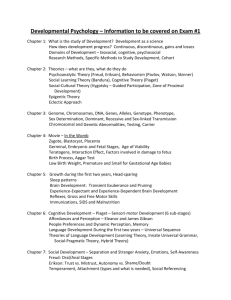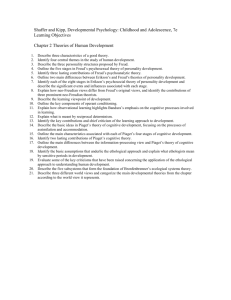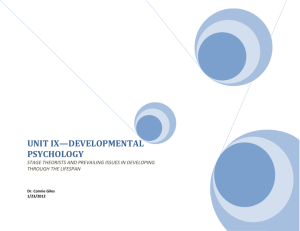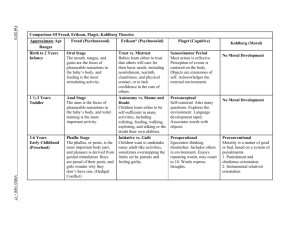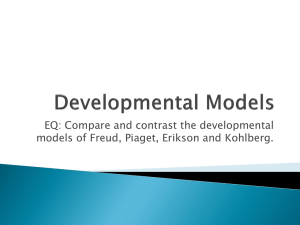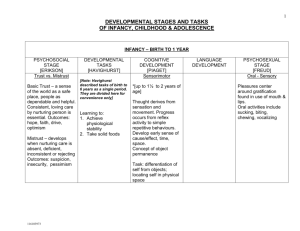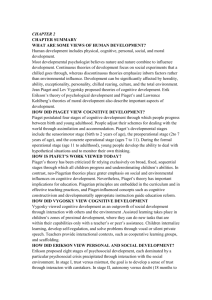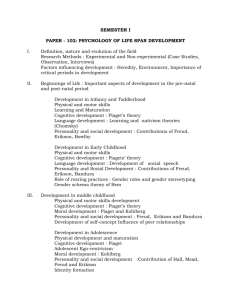Child Psychology
advertisement
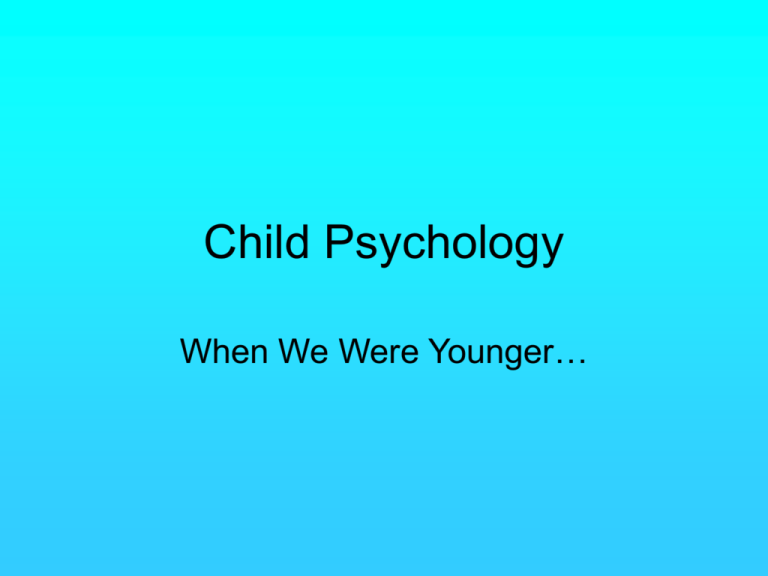
Child Psychology When We Were Younger… Child Psychology DEVELOPMENTAL PSYCHOLOGY • DEVELOPMENTAL PSYCHOLOGY investigates the course of social, moral, emotional and intellectual development over the life span. Developmental psychologists describe, explain and attempt to predict age-related behaviors. They often focus on the MATURATION PROCESS, early experiences and critical stages in human development. MATURATION PROCESS NATURE VERSUS NURTURE • The NATURE-NURTURE controversy is over the relative importance of heredity (nature) versus the role of the environment (nurture). Most developmental psychologists now believe our behavior is strongly shaped by CONSTITUTIONAL FACTORS that are largely hereditary such as body build and TEMPERAMENT FACTORS that include personality characteristics such as adaptability to new experience and regularity as well as tendencies to be happy or sad, irritable or easy, cheerful or glum. Tendencies to Cheerful or Glum NATURE VERSUS NURTURE • Biological and genetic research with twin studies also indicates genetics or NATURE plays a part in predispositions to physical and mental illnesses as well as being influenced by NURTURE, our environment, experience, practice and learning. Nature Vs. Nurture BIOLOGICAL APPROACH • The BIOLOGICAL APPROACH is supported by the longitudinal research of Thomas and Chess that found that the TEMPERAMENT of the child at 3 months was a fair predictor of his or her temperament at 10 years. Temperament seems to have a strong biological basis as it tends to be stable over time. Many developmental psychologists believe that MATURATION, the changes in development that involve the unfolding of biologically determined behavior programmed by the genes, occurs in CRITICAL PERIODS. A CRITICAL PERIOD is a stage in development during which certain kinds of growth must occur if development is to proceed normally. Temperament PSYCHOSEXUAL DEVELOPMENT THEORY • Sigmund Freud's theory of PSYCHOSEXUAL DEVELOPMENT focuses on the way in which the sexual, sensual and pleasure needs of the individual are satisfied during various stages in life. Freud called the unconscious drives LIFE INSTINCTS AND DEATH INSTINCTS, residing as a part of the ID, a forceful "seething cauldron" of unconscious urges for pleasure. The ID is present at birth and contains all instinctual drives and motives and operates according to the PLEASURE PRINCIPLE, seeking IMMEDIATE GRATIFICATION of a drive... Freud used the term SEXUAL INSTINCTS to refer to desires for all forms of pleasure, not just erotic sexuality. Freud PSYCHOSEXUAL DEVELOPMENT THEORY • PSYCHOSEXUAL STAGES according to Freud are developmental periods during which the sexual and life energies of the id find different sources of satisfaction. Freud postulated that in each PSYCHOSEXUAL STAGE, individual pleasures must be gratified if personality development is to proceed normally. If the internal and external conflicts posed by each stage are not resolved, a person would become FIXATED. If a child's needs were either overindulged or frustrated in a particular stage, he/she would become FIXATED, stuck in that stage. The child although developing chronologically would retain methods and personality characteristics that would attempt to meet the unmet needs of the earlier PSYCHOSEXUAL STAGE. PSYCHOSEXUAL STAGES • Freud theorized five stages OR CRITICAL PERIODS of development; Oral, Anal, Phallic, Latency and Genital. As the mind was profoundly shaped by early childhood experiences, personality was largely DETERMINED by age 5, the end of the phallic stage. Each period has a sexual focus that is gratified, frustrated or overindulged, leaving a lasting imprint on personality. PSYCHOSEXUAL STAGES • ORAL STAGE • During the ORAL STAGE, first 18 months of life, the infant finds great sources of pleasure from sucking and later biting and chewing to fulfill instinctual drives or satisfy hunger. Handling of a child's feeding experience by the primary caregiver gives the child feelings of optimism, (my needs will be met) or pessimism if his/her needs and demands are frustrated or denied. Freud theorized FIXATION at the oral stage could lead to obsessive eating, smoking, talking or drinking to try to obtain oral satisfaction. If overindulged one develops an ORAL DEPENDENT personality, refusing to grow up, holding on to having one's needs satisfied from others who love, cherish and take care of them. Freud Oral Fixation PSYCHOSEXUAL STAGES • ANAL STAGE • As the child matures into the SECOND YEAR OF LIFE he or she is able to exert more control to get needs met through walking, talking, grabbing and hitting if necessary. As he attempts to gain more control he derives pleasure from exploring the environment, testing the strength of his will power over parents and authority figures. A crucial event to Freud was toilet training that represents society's systematic efforts to control the child's biological urges. PSYCHOSEXUAL STAGES • ANAL STAGE • If toilet training and other areas of discipline are too punitive and severe, the child may become ANALRETENTIVE, holding back not only feces but becoming constricted, stubborn, rigid, meticulous and precise, an "over-controlled" personality. The rebellious child may become ANAL-EXPULSIVE, letting go of feelings, defiantly strong-willed. Although self-confident and creative, the anal-expulsive becomes fixated on expulsive (letting go) activities, actively insisting on pursuing one's own path while fighting external rules, regulations and requests that might threaten one's autonomy Anal Stage PSYCHOSEXUAL STAGES • PHALLIC STAGE • Freud proposed that children enter into the PHALLIC STAGE of psychosexual development at 4 years of age when they become curious about sexuality. They openly explore and play with their bodies and enjoying being naked. Children also become interested in the parent of the opposite sex. Little girls develop a special attachment to their father that Freud called the ELECTRA COMPLEX. They actively seek attention and "flirt" with fathers. The little girl loves to sit in his lap or to play "grown -up" woman in mother's make-up and shoes. If the girl's attempts to attract his attention are successful and her father responds fully and positively, she gains sex-role assuredness and a positive relationship with men. This sex-role assuredness allows her to re-identify with the mother, the same-sex parent, resolving the Electra Complex. PSYCHOSEXUAL STAGES • PHALLIC STAGE • Boys also have this underlying attachment for the opposite sex parent, in this case the mother, called the OEDIPAL COMPLEX. As the fulfiller of all the boy's needs for security, love and comfort, the boy is strongly attached to the loving mother and threatened by the father, the obvious competitor for mom's affections. Boys may develop a castration complex towards the father who might punish desires for his mother. Eventually the conflict is resolved as the boy begins to model after the father, achieving IDENTIFICATION WITH THE SAMESEX PARENT, signaling the end of Phallic Stage. Oedipal Stage You know, there was soooo much I could do, but I chose the “clean” route. PSYCHOSEXUAL STAGES • LATENCY, GENITAL STAGES • From around age 6 to puberty the child's sexuality is largely repressed, Freud called this the LATENCY PERIOD. With the advent of puberty sexual urges reappear and the sexual energy is normally channeled toward peers of the opposite sex. This GENITAL STAGE lasts throughout life. PSYCHOSOCIAL STAGES OF DEVELOPMENT • Erik Erikson emphasized the SOCIAL aspects of personality development. He proposed that people encounter a series of eight crises in life surrounding their social relationships with others that he called PSYCHOSOCIAL CRISES. A CRITICAL STAGE theorist, Erikson believed these crises determined the personality character of the person, each crisis having favorable or unfavorable consequences on personality development that remained in the psyche for the rest of life. Erik Erikson PSYCHOSOCIAL STAGES OF DEVELOPMENT • Erikson differed from Freud who felt the "Child is father of the man...” While Freud felt the most important years of personality development were the first five, Erikson emphasized the ongoing nature of personality development from birth through death. Each stage of psychosocial development with the crisis and favorable social condition and outcome and possible negative conditions and outcome is reviewed below. PSYCHOSOCIAL STAGES OF DEVELOPMENT • Stage 1: Basic trust vs. mistrust (Birth to 12-18 months): infant must form a first loving, trusting relationship with the caregiver or develop a sense of mistrust. Trust vs. Mistrust PSYCHOSOCIAL STAGES OF DEVELOPMENT • Stage 2: Autonomy vs. shame/doubt (18 months to 3 years): the child's energies are directed toward the development of physical skills, including walking, grasping, controlling the sphincter. the child learns to control but may develop shame and doubt if not handled well. Autonomy vs. Shame/doubt PSYCHOSOCIAL STAGES OF DEVELOPMENT • Stage 3: Initiative vs. guilt (3 to 6 years): the child continues to become more assertive and to take more initiative but may be too forceful, which can lead to guilt feelings. Initiative vs. Guilt PSYCHOSOCIAL STAGES OF DEVELOPMENT • Stage 4: Industry vs. inferiority (6 to 12 years): the child must deal with demands to learn new skills or risk a sense of inferiority, failure, or incompetence. Industry vs. Inferiority PSYCHOSOCIAL STAGES OF DEVELOPMENT • Stage 5: Identity vs. role confusion (adolescence): the teenager must achieve identity in occupation, gender roles, politics, and religion. Peer Pressure PSYCHOSOCIAL STAGES OF DEVELOPMENT • Stage 6: Intimacy vs. isolation (young adulthood): the young adult must develop intimate relationships or suffer feelings or isolation. Intimacy vs. Isolation PSYCHOSOCIAL STAGES OF DEVELOPMENT • Stage 7: Generativity vs. stagnation (middle adulthood): each adult must find some way to satisfy and support the next generation. Generativity vs. Stagnation PSYCHOSOCIAL STAGES OF DEVELOPMENT • Stage 8: Ego integrity vs. despair (late adulthood): the culmination is a sense of acceptance of oneself as one is and a sense of fulfillment Ego Integrity vs. Despair PIAGET’S THEORY OF COGNITIVE DEVELOPMENT • COGNITIVE DEVELOPMENT investigates how patterns of thinking, reasoning, remembering and problem-solving change during a child’s development. JEAN PIAGET is an important theorist who attempted to explain how human intelligence develops through the child’s ADAPTATION to the environment. JEAN PIAGET PIAGET’S THEORY OF COGNITIVE DEVELOPMENT • Piaget proposed that the child uses two processes to adapt, ASSIMILATION, wherein the child processes experiences, accepting and fitting them into different SCHEMES and ACCOMODATION, wherein the child encounters new information that does not fit into present schemes and the child changes their scheme to accommodate the new information. Piaget felt all children go through clear stages of intellectual development in the same order and defined the major characteristics of his STAGES OF COGNITIVE DEVELOPMENT. ASSIMILATION PIAGET’S THEORY OF COGNITIVE DEVELOPMENT • SENSORIMOTOR PERIOD • During the SENSORIMOTOR PERIOD, from Birth to Approximately Two Years, the infant perceives the world through his/her senses. By seeing, touching, hearing, sucking and feeling the environment, they learn and begin to act on the environment through their motor activities. The major development is the gradual movement from reflexes that are inborn to a use of mental symbols to represent objects such as mother. The achievement of this great leap to symbolic thought is OBJECT PERMANENCE, when the child recognizes that objects continue to exist even when they are not visible. Now they can begin to use mental symbols to think and represent absent objects. Object Permanence PIAGET’S THEORY OF COGNITIVE DEVELOPMENT • PREOPERATIONAL STAGE • The PREOPERATIONAL STAGE occurs from 2 to 6 years. As they improve their ability to think in terms of symbolic thought, the foundation of thinking, remembering and language, they encounter shortcomings that distinctly define their thinking. They are EGOCENTRIC and selfcentered in their thinking, unable to understand life from any perspective other than their own. Egocentrism leads to ANIMISM, the belief that all things are living, just like oneself. PIAGET’S THEORY OF COGNITIVE DEVELOPMENT • PREOPERATIONAL STAGE • In the pre-operational stage, the child begins to use language as symbols but is still unable to think in a truly logical fashion. They cannot perform "Mental Operations", internal manipulations, transformations and reorganizations of mental structures and are therefore limited to PREOPERATIONAL THOUGHT. The child experiences CENTRATION, a tendency to focus on one feature of a group, neglecting all other aspects and IRREVERSIBILITY, an inability to envision a reverse action. He has not mastered CONSERVATION, the awareness that physical qualities such as height, weight, number and volume remain constant despite changes in their shape or appearance. PREOPERATIONAL STAGE PIAGET’S THEORY OF COGNITIVE DEVELOPMENT • CONCRETE OPERATIONS • The CONCRETE OPERATIONAL STAGE, from 7 to 12 years is characterized by the development of conservation, mastery of reversibility and decentration, a gradual loss of egocentric thinking. This allows the child to begin to reason logically and to organize thoughts coherently. However they can only think about actual CONCRETE, physical objects and cannot handle abstract reasoning. Children in this stage can perform CONCRETE OPERATIONS, or mental transformations and reorganizations on concrete objects and events. They can begin to coordinate several aspects of a problem and recognize there are several ways to look at things. CONCRETE OPERATIONS PIAGET’S THEORY OF COGNITIVE DEVELOPMENT • FORMAL OPERATIONS • The FORMAL OPERATIONAL STAGE begins approximately at 11 or 12 and continues through adulthood, although Piaget emphasized that some may never attain this ability to think abstractly. The formal operational stage is characterized by thought processes that are abstract, systematic, reflective and logical. PIAGET’S THEORY OF COGNITIVE DEVELOPMENT • FORMAL OPERATIONS • Adolescents develop the ability to formulate hypotheses and systematically test them to arrive at an answer to a problem (hypothetical-deductive reasoning). The adolescent can apply mental operations to abstract concepts such as love, free will, "good parenting" and others ideas and ideals and spend hours "thinking" about and debating topics of interest. With practice the adolescent begins to develop clear, logical and systematic thinking although they do suffer often from the egocentric and idealistic biases of early adolescent years. As we mature the development of thinking to Piaget is measured by degree rather than fundamental changes in the nature of thinking. Formal Operational Stage KOHLBERG’S LEVELS OF MORAL DEVELOPMENT • LAWRENCE KOHLBERG agreed with Piaget that a child’s moral development depended on their level of cognitive development and investigated the development of moral reasoning. He posed hypothetical situations or moral dilemmas wherein people had to make a difficult decision and justify their choices. He proposed people have three levels of moral development incorporating six stages. LAWRENCE KOHLBERG KOHLBERG’S LEVELS OF MORAL DEVELOPMENT • LEVEL ONE: PRECONVENTIONAL MORALITY • Young children judge situations solely on their own needs and perceptions. Their primary goal in STAGE ONE: Punishment-Obedience Orientation is to avoid punishment and a good or bad action is determined by its physical consequences. Children comply with rules to avoid punishment. Obedience KOHLBERG’S LEVELS OF MORAL DEVELOPMENT • LEVEL ONE: PRECONVENTIONAL MORALITY • STAGE TWO: Personal (Naïve) Reward Orientation includes a compliance with rules to gain rewards. Children may "share" if it leads to positive rewards. Acts are "right" because they lead to positive consequences. Both reasoning is in terms of "external authority." Personal Reward KOHLBERG’S LEVELS OF MORAL DEVELOPMENT • LEVEL TWO: CONVENTIONAL MORALITY • Older children take into account the expectations of society and rules when they make a decision about a moral dilemma. In STAGE THREE: Goodboy/Good-girl Orientation they conform to rules and their behavior is determined by what will lead to approval or disapproval. Good-boy/Good-girl Orientation KOHLBERG’S LEVELS OF MORAL DEVELOPMENT • LEVEL TWO: CONVENTIONAL MORALITY • At STAGE FOUR: Authority Orientation, the child rigidly conforms to society’s rules and respects authority. Often called the Law and Order Orientation, children obey rules and punish wrongdoing. Their tendency to think concretely makes them prefer concrete specific rules and regulations. Law and Order Orientation KOHLBERG’S LEVELS OF MORAL DEVELOPMENT • LEVEL THREE: POSTCONVENTIONAL MORALITY • During adolescence, many begin to think abstractly and reflectively. They are flexible in their reasoning and base their judgments on abstract, personal principles that may or may not agree with society’s laws. They challenge conventional rules and thinking, personalizing morality. Adolescence, many begin to think abstractly and reflectively PTHS KOHLBERG’S LEVELS OF MORAL DEVELOPMENT • LEVEL THREE: POSTCONVENTIONAL MORALITY • STAGE FIVE: Social Contract Orientation recognizes that good is determined by socially agreed upon standards of individual rights. Rules are necessary for social order, but rules can be changed if the social contract is not mutually beneficial. Social Contract Orientation KOHLBERG’S LEVELS OF MORAL DEVELOPMENT • LEVEL THREE: POSTCONVENTIONAL MORALITY • STAGE SIX: Morality of Individual Principles and Conscience includes abstract thinking about higher internal moral principles such as equality, justice and human dignity. Laws become somewhat arbitrary and what is right is what is right to the individual in the specific instance according to personal ethics and conscience. Morality of Individual Principles
